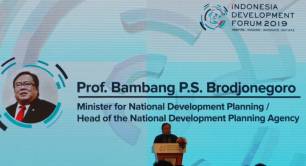Economic recovery must factor in voices of developing nations - G20 Impact Day
The voices of developing nations must be heard at this year’s G20 Summit, Asian leaders have urged on the eve of the AVPN Global Conference which opens in Bali, Indonesia tomorrow, 21 June.
At the ‘G20 Impact Day’, an event held in Bali for selected members of AVPN on the day before the network’s Global Conference, discussions centred around the priorities that the Indonesian government, this year’s host of the G20 Summit, has identified for global leaders to focus upon.
AVPN, which brings together impact investors, policy makers, academics and others from across the Asia-Pacific region, is supporting the Indonesian government to take forward discussions on sustainable finance and developing the potential of micro, small and medium-sized enterprises.
- Read more about the priorities of this year’s G20 Summit in our feature: From billions to trillions: finding the funding to address the world’s biggest challenges
With the world’s economies still recovering from the Covid-19 pandemic while also being shaken by the effects of the conflict in Ukraine, speakers emphasised the need to account for unequal progress on the key G20 themes, as well as the need to listen to developing nations.
The challenge is how we can bring back the economy – a new type of economy
“There are a lot of aspects we need to consider during the recovery process,” said Professor Bambang Brodjonegoro (pictured top), a former senior minister in the Indonesian government, now an academic and co-chair of the G20’s think tank, the T20. “Recovery is not just trying to get the economy back to what it was prior to the pandemic. The challenge is how we can bring back the economy – a new type of economy.”
He added that the G20 was still dominated by its developed nation members. “We hope by being the host of G20 we can share a vision that’s closer to the needs of developing nations,” he said.
Raden Siliwanti (pictured), from the Indonesian government’s ministry of national development planning (Bappenas) and co-chair of the G20 development working group, said: “The G20 should be relevant not only to its members but also for the world at large, particularly developing countries and small island states.”
Gaping finance gap
Speakers emphasised the importance of blended finance – the use of catalytic capital from public or philanthropic sources to increase private sector investment – in meeting the Sustainable Development Goals, particularly as the finance gap needed to achieve the goals has widened to an estimated US$4.2tn a year since the pandemic.
Professor Bambang pointed out that the G20’s three key priorities – strengthening the global health architecture, digital transformation and the transition to sustainable energy – all needed to be considered from an inclusion and equality point of view. For example, the transition to sustainable energy could not be achieved globally unless renewable energy became more affordable for developing nations.
We need family offices and other philanthropic organisations to catalyse blended finance, and to influence others to come in
“When discussing the energy transition, let’s not exclude the word affordable,” he said.
Komal Sahu, AVPN’s chief of sustainable finance, pointed out that the overarching barrier to getting more blended finance deals working towards meeting the sustainable development goals was “awareness and understanding” of it.
She urged impact investors across the Asia-Pacific to play their role. “We need family offices and other philanthropic organisations to step up to do what’s necessary to catalyse blended finance, and to influence others to come in,” she said.
Photos courtesy AVPN
Thanks for reading Pioneers Post. As an entrepreneur or investor yourself, you'll know that producing quality work doesn't come free. We rely on our subscribers to sustain our journalism – so if you think it's worth having an independent, specialist media platform that covers social enterprise stories, please consider subscribing. You'll also be buying social: Pioneers Post is a social enterprise itself, reinvesting all our profits into helping you do good business, better.



